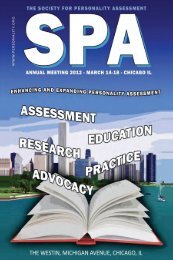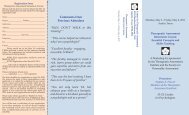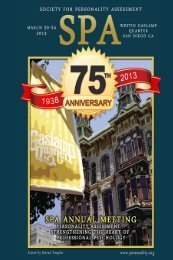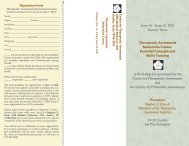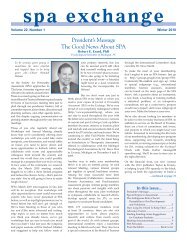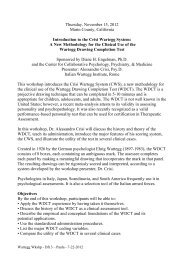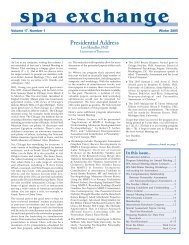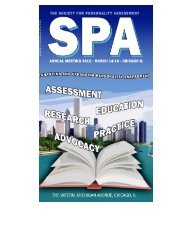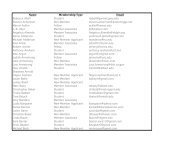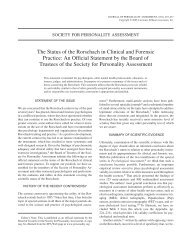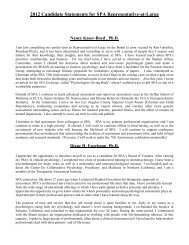From Routledge Journals - Society for Personality Assessment
From Routledge Journals - Society for Personality Assessment
From Routledge Journals - Society for Personality Assessment
Create successful ePaper yourself
Turn your PDF publications into a flip-book with our unique Google optimized e-Paper software.
Workshop #8The Rorschach Comprehensive System: Codingand AdministrationBarry Ritzler, Ph.D.Long Island University, NYAnthony Sciara, Ph.D.Asheville, NCThe workshop will cover advanced coding issues that frequentlypuzzle the Rorschach psychologist. Since proper administrationof the method reduces the difficulty of coding decisions, Dr.Sciara will begin by reviewing proper administration procedures.Next, Dr. Ritzler will provide guidelines <strong>for</strong> several difficult codingdecisions. Dr. Sciara’s presentation will outline proper administrationprocedures to assure precision and standardizationof the Comprehensive System. Dr. Ritzler will cover difficultcoding issues such as FC versus CF, active versus passive movement,shading determinants, and special scores. Both presenterswill discuss the addition of certain enhancement variablesthat have been included in the Rorschach Training Programworkshops. These variables include the Rorschach Oral DependencyScale and Aggressive Content.Goals and Objectives:1. Improve administration skills, particularly inquiry, to providemore effective, necessary in<strong>for</strong>mation <strong>for</strong> correct scoring.2. Provide guidelines <strong>for</strong> making difficult scoring decisions.3. Familiarize participants with Comprehensive System enhancementvariables.4. Answer questions participants have about coding and administrationissues.Skill Level: Participants must be familiar with the RorschachComprehensive System through at least one semester’s graduatetraining or the equivalent.Wednesday, March 24, 20105:00 pm - 8:30 pmHalf-Day, 3.5 CE CreditsWorkshop #9The Black Swan: Threat <strong>Assessment</strong> of LowFrequency High Intensity ViolenceJ. Reid Meloy, Ph.D.Forensis, San Diego, CA2010 WORKSHOPS - MARCH 25Low frequency high intensity violence, such as acts of terrorism,mass murder, and public assassinations, cannot be predicted,but their risk can be reduced. Dr. Meloy will present anidiographic model which depends upon the identification of apathway to violence—dynamic factors, markers, speed, direction—andprovides a functional and behavioral approach to discerningvariables associated with such acts of instrumental orpredatory aggression. The approach differs conceptually andoperationally from the traditional nomothetic approach to violencerisk assessment, and has been widely adapted by threatassessment teams in the US and Western Europe, whether university,corporate, or government based.Goals and Objectives:1. Describe the four approaches to violence risk assessment,including the idiographic approach taught in this class.2. Describe a pathway to violence.3. Describe markers along a pathway to violence.4. Explain how this approach has been applied to low frequencyhigh intensity acts of violence, such as mass murder and publicassassinations.Skill Level: This workshop is appropriate <strong>for</strong> all graduatestudents and Ph.D./Psy.D. psychologists.Thursday, March 25, 20108:00 am - 11:30 amHalf-Day, 3.5 CE CreditsWorkshop #10<strong>Personality</strong> Focused <strong>Assessment</strong>:An IntroductionMark A. Blais, Ph.D.Psychology <strong>Assessment</strong> Center, Boston, MAPsychological assessment requires moving beyond simple scorebehaviorrelationships and using multi-source data to describecomplex human behaviors (Handler & Meyer, 1998). Many believethat the integration of personality theory along with assessmentknowledge and skill is required to achieve this level of proficiency.This workshop on <strong>Personality</strong> Focused <strong>Assessment</strong> (PFA),presents an approach to psychological assessment that uses amodern model of personality to enhance data organization andintegration. Specifically PFA uses a trans-theoretical model ofpersonality, in<strong>for</strong>med by Mayer’s systems framework (1998 &2005), to articulate the major sub-divisions and organizationpersonality and explicitly relates assessment findings to featuresof the model. PFA has been used to teach advanced psychologicalassessment to psychology interns and post doctoral fellows<strong>for</strong> the last decade and has recently been presented in a numberof book chapters (Blais and Smith, 2008 & Blais and Hopwood, inpress). This workshop will provide a general overview of thetrans-theoretical model of personality and demonstrate specificallyhow assessment data from commonly used instruments(Rorschach, <strong>Personality</strong> <strong>Assessment</strong> Inventory and NEO-<strong>Personality</strong>Inventory Revised) can be aligned with the model to providea personality focused organization and integration of findings.Clinical examples will be used to illustrate the potential PFA holds<strong>for</strong> producing dynamic, integrated assessment <strong>for</strong>mulations thatplaces the person at the center of our assessment reports.Goals and Objectives:1. Present a trans-theoretical model of personality organizationand demonstrate how the model may be used to improve theorganization, integration and interpretation of common psychologicalassessment data.To register visit: www.personality.org / 9



